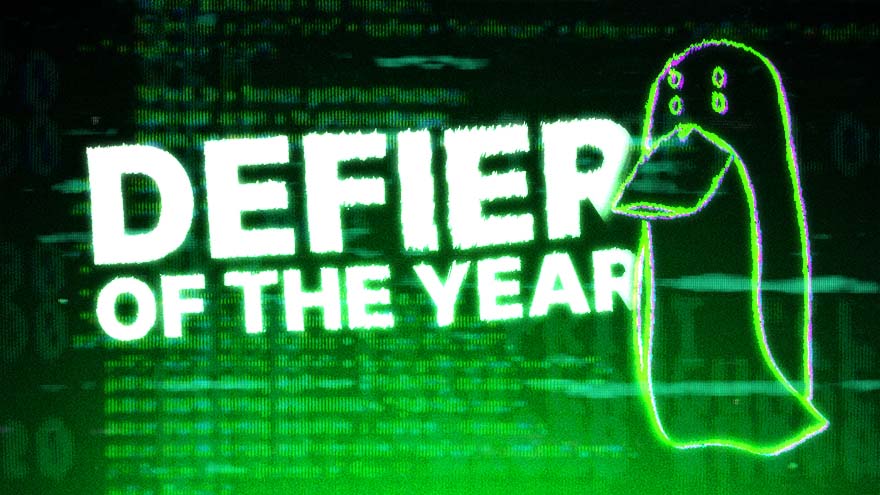© Defiant Media Inc 2022
Advertisement
Deeply Researched Probes of Questionable Projects Proved ‘Invaluable’ in Mad Year
By: Aleksandar Gilbert
“The obvious,” one commenter wrote, “needs to be stated again and again.”
And what might that be?
“The space is not only safer and smarter because of you, but unequivocally better,” they told the man who moonlights as crypto sleuth ZachXBT on Twitter.
The Defiant community agrees.
When The Defiant set out to select the most influential DeFi player in the past 12 months, we conducted a Twitter poll. The result: Our followers voted Zach the 2022 Defier of the year, a figure who puts the ideals that animate the industry into practice.
The selection of ZachXBT says so much about the place crypto has arrived at in 2023. This is an industry shit through with idealism and lofty goals, but it is also one that is sadly saturated with scammers and snake oil salesmen. When anti-crypto Rep.Brad Sherman (D-Calif.) called the space a “garden of snakes,” even some true believers had to admit he had a point.
Several firms have sprouted up to plumb the fraud in crypto, most notably Chainalysis, TRM Labs, and Elliptic.
But those companies are, well, companies. Their services aren’t free, their insights are closely guarded, and shared primarily with paying customers.
That’s where Zach comes in.
This past bull run I started to notice coordinated shilling efforts once again for questionable projects by influencers and became frustrated nothing was being done.
He shares his regular, deeply researched takedowns of crypto hucksters on Twitter, Medium and Mirror, aiding retail investors and law enforcement agencies alike — one of his investigations was cited this year by French authorities.
When news of a massive crypto hack breaks, people invariably tag @zachXBT, hoping he’ll follow the chain and shed some real-time light on the situation.
In a Twitter conversation, Zach told The Defiant he first became attuned to crypto chicanery during the ICO boom in 2017.
“This past bull run I started to notice coordinated shilling efforts once again for questionable projects by influencers and became frustrated nothing was being done,” he said. He had already been tracking wallets he found interesting, and the move to on-chain forensics came quite naturally.
Bridging Protocols Hardest Hit in Year That Exposed Key Vulnerability
It’s high-stakes work. Scammers make off with enormous amounts of money, and scorn is, of course, justified. But in the all-digital world of crypto, reputations can be destroyed in a second, and outing a purported scammer isn’t something that should be taken lightly.
Zach says his work is peer-reviewed for inaccuracy.
“Typically multiple people have reviewed an article or thread before it gets posted,” he said.
His work has earned him a unique reputation in the crypto industry, and made him extremely busy. In September, he admitted to burnout — “Really am unsure how much longer I can keep doing this” — and almost a thousand messages poured in, urging him to keep up the good fight.
“Your work is invaluable,” Cooper Turley, an investor and former Defiant contributor, wrote, speaking for just about everyone else who wrote to Zach that day.
Zach holds down a full-time job, and estimated his crypto detective work takes between 50 and 60 additional hours per week. (He didn’t share the nature of his day job. Before responding to a list of questions, he noted he would be vague answering any that gestured toward his personal life.)
“It definitely has impacted my personal life negatively but would not say that is unique to me and is more so due to the nature of working in the crypto space,” he said. “If you step away for a few hours it can feel like a lifetime at times.”
The work can also get lonely.
“I find it hard to trust people,” he said. “I always want to assume the best in people but many don’t have your best intentions in mind.”
But it’s also rewarding. A highlight came in October, when French law enforcement officials arrested a pair of scammers relying, in part, on evidence Zach had gathered.
The scammers had managed to phish more than $2M worth of Bored Ape and other blue-chip NFTs from unsuspecting victims, according to his investigation. When the pair were arrested in Paris, French prosecutor Christophe Durand said his office’s investigation was prompted by information Zach had shared online.
DAOs, Mixers, and Exchanges Felt the Sting of Officialdom in a Watershed Year
Zach now has more than 200,000 followers on Twitter, and his work has been cited in The New York Times, The Financial Times, Bloomberg News, Vice and, of course, crypto native publications like The Defiant and CoinDesk.
“It certainly is a strange position to be in,” he said. “I really enjoy what I do and more specifically the research process but it’s hard to keep up with everything since this space moves incredibly fast.”
He continued, “There is a lot of pressure to not mess up and stay on top of every single event. In reality it’s not feasible to respond and help every person who reaches out so it can be frustrating when I fall short of where I want to.”
He’s also come to realize the pro-bono, public work that he and his peers do isn’t enough to keep crypto honest.
“In a perfect world I would say the space is completely self-regulated,” he said. “Unfortunately I think we have gone past the point where that is possible. On the other hand it has been frustrating to watch the US government try to rush legislation and set dangerous precedents for the space. I hope we can find some balance between the two.”
Get the 5-minute newsletter keeping 80K+ crypto innovators in the loop.
Samuel Haig•
Aleksandar Gilbert•
Samuel Haig•
Samuel Haig•
Aleksandar Gilbert•
Advertisement
Author
Administraroot

